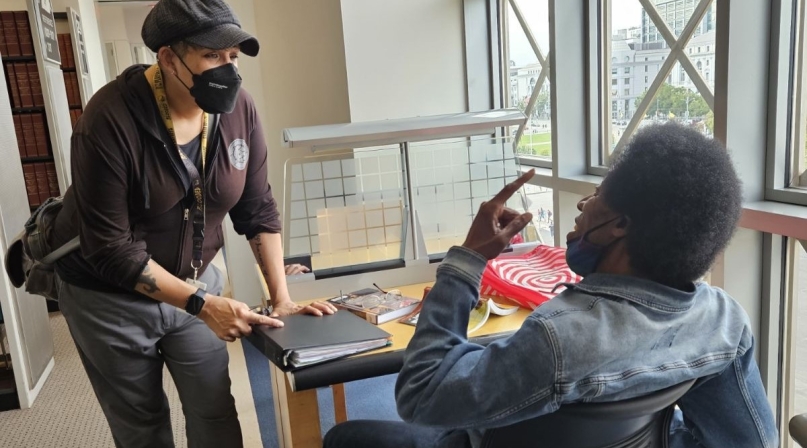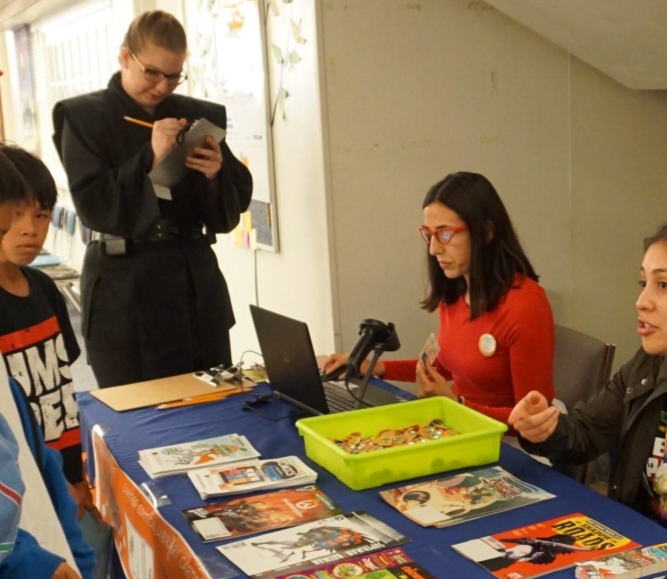Library program offers path to employment, stability

Key Takeaways
Jen Keys knows what it’s like to be unhoused in San Francisco. Once in managerial roles at major dotcom and airline companies, with years of experience, she spiraled into hardship after she was laid off in 2008.
For months after, she lived on the consolidated city-county’s streets, working sporadically under the table to earn money to pay for her drug use. Her journey paralleled that of so many others — childhood trauma sowing the seeds for mental health challenges later in life, which led to unemployment and substance use disorder.
“Everybody and anybody can become unhoused,” Keys said. “It’s a very rough cycle, very lonely cycle.”
But Keys, through the support of her care team and her own hard work, has since exited this cycle. Today, she spends her days at the main branch of the San Francisco Public Library, working to help others do the same. As a Health and Safety Associate (HaSA), she provides care and support to the unhoused patrons who congregate at the library — monitoring for overdoses and connecting them with county services such as showers, food or shelter.
The HaSA program, started in 2010, is equal parts homeless outreach and workforce development. Employing individuals with lived experience like Jen to provide care to library patrons who are currently unhoused provides a unique upside to both parties. Patrons receive non-judgmental empathetic care from those who are well-positioned to understand their challenges. And HaSAs can build work experience in a safe space, drawing on their expertise to give back to the community while gradually reintegrating into society at large.
“It gives you a sense of meaning and purpose…it gives you that starting point to do whatever you want — to go back to school, to get a different job,”
Keys said. “Learning life skills, I mean just showing up for work, learning how to communicate again, learning how to be a part of society. It had all the guardrails, so it was very safe.”
The program has been a great success, with former HaSAs using their training to enter a variety of professions, from health care to the culinary arts. In 2023, HaSAs became full-fledged city/county employees, earning the full suite of benefits provided to public-sector workers. And through strong support from the Library Commission and county leadership, the program that originally employed four people is set to expand to nine this year. More than 30 HaSAs have worked in the program over the years.
It’s a model that has great potential around the United States. And it highlights the unique value of the library — a public space for every citizen, regardless of who they are.
Today, millions of Americans visit libraries for information. Sometimes, that information is found in books and magazines. Other times, patrons seek information that lives outside of library walls, like emergency shelter or public benefits. In the latter case, the library and its HaSAs serve as the front door to a vast network of these human services programs.
“It makes a whole lot of sense for the library to provide these services because a lot of people, while the shelters are closed, are here,” explained Leah Esguerra, the San Francisco Public Library’s Social Service Program Supervisor.
Esguerra likely became the world’s first library-based social worker when San Francisco piloted the idea in 2009. Today, cities and counties in places from Arizona to Scandinavia to Colombia seek to follow in the program’s footsteps. Over the last 15 years, Esguerra has helped other communities shape the program to meet the unique needs of their residents. In Pima County, Ariz. for instance, registered nurses staff rather than a social worker staff the library, a choice made to be responsive to the county context.
Esguerra’s work has paved the path for HaSAs like Keys to deliver dignified, compassionate care at the San Francisco Public Library.
And in turn, Keys’ story embodies the power of cross-systems collaboration and peer support’s power to transform lives. Once stuck in a vicious cycle, she is now contributing to a virtuous cycle of growth and spending her days working to uplift others.
“Being unhoused isn’t an identity, it’s an experience,” Keys said. “Every single one of these individuals has a story. They are valuable and they are important. And there are opportunities.”
Related News

USDA and HHS release new dietary guidelines
On January 7, U.S. Department of Agriculture Secretary Brooke Rollins and U.S. Department of Health and Human Services Secretary Robert F. Kennedy, Jr. unveiled the new Dietary Guidelines for Americans, 2025–2030.

Podcast: Developing your county workforce
Counties are finding a renewed interest in professional development as a feature of their careers.
County News
Pop-up libraries find new ways to promote services, improve outreach

